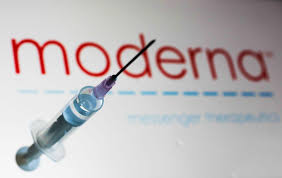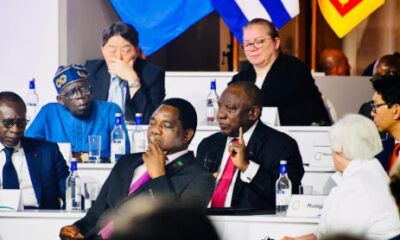News
Another COVID-19 vaccine, Moderna, records 94.5% success

The quest for effective vaccines to combat the ravaging coronavirus has recorded another breakthrough with a United States-based biotech firm, Moderna Inc, saying on Monday that its experimental vaccine was 94.5 per cent effective in preventing the disease, according to an analysis of its clinical trial.
The report from multiple sources including BBC, Reuters and The Guardian comes a week after Pfizer and BioNTech said their vaccine was more than 90 per cent effective.
The results for both vaccines were from interim analyses of large clinical studies.
An interim analysis of the Moderna released on Monday, and based on 95 patients with confirmed COVID-19 infections found the candidate vaccine has an efficacy of 94.5 per cent.
In the result from the Moderna study, there were 30,000 volunteers; half got two doses of the vaccine 28 days apart; half got two shots of a placebo on the same schedule.
There were 95 instances of COVID-19 illness among the study participants — only five of those cases were in the vaccinated group. Ninety were in the group receiving the placebo.
Of these, there were said to be 11 cases of severe disease. The results indicate the vaccine was inducing the kind of immune response that protects people if they were exposed to the coronavirus.
Chief Executive Officer of Moderna, Stéphane Bancel, was quoted as saying in a statement, “This positive interim analysis from our Phase 3 study has given us the first clinical validation that our vaccine can prevent COVID-19 disease, including severe disease.”
Moderna said it had improved the shelf life and stability of its own vaccine, meaning that it can be stored at standard refrigeration temperatures of 2C to 8C for 30 days.
The company said it planned to apply to the US regulator, the Food and Drug Administration, for emergency-use authorisation in the coming weeks.
The results are the latest encouraging news to emerge from the breakneck effort to develop a vaccine against coronavirus and follow a similar interim analysis earlier this month from a collaboration between Pfizer and the German firm BioNTech, which suggest its vaccine is 90 per cent effective at preventing illness.
The Moderna vaccine is however not expected to be available outside the US until next year.
The biotech company said it would have 20m doses ready to ship in the US before the end of 2020 and hoped to manufacture 500 million to one billion doses globally next year.
So far, the UK does not stand to benefit from the vaccine. Moderna has agreed to provide the US with 100 million doses, with an option to buy 400m more. Japan, Canada, Switzerland, Qatar and Israel have also signed agreements, and the European commission has a “potential purchase agreement” for 80m-160m doses. The UK chose not to participate in the EU vaccine purchase scheme, with the health secretary, Matt Hancock, arguing in July that the government could source vaccine faster on its own. However, a Whitehall source said the UK government was in “advanced discussions” to procure doses of the Moderna vaccine.
The Moderna vaccine, which is based on similar mRNA technology as BioNTech’s, is expected to be assessed by the FDA on a final analysis of 151 COVID cases among trial participants who will be followed on average for more than two months.
If the results remain as impressive as the trial goes on, the Moderna vaccine could potentially provide a major advantage over the Pfizer vaccine.
While Pfizer’s vaccine requires ultracold freezing between -70C and -80C from production facility to patient, Moderna said it had improved the shelf life and stability of its own vaccine, meaning that it can be stored at standard refrigeration temperatures of 2C to 8C for 30 days.
It could be stored for six months at -20C for shipping and long-term storage, the company said.
Cost and side effects
At £38 to £45 for a course of two shots, Moderna’s vaccine is more expensive than the other frontrunners. AstraZeneca and Oxford University are aiming to sell their vaccine at about £3 a dose, while vaccines in trial with Johnson and Johnson and collaboration between Sanofi and GSK are both expected to cost about £8 a dose.
Pfizer is charging the US about £30 for a two-shot course. The UK has ordered 40 million Pfizer shots but none of the Moderna vaccine.
Moderna’s two-shot vaccine injects genetic material called mRNA into the body, which cells then use to churn out the spike protein the virus uses to invade cells.
The spike protein covers the surface of the virus and is one of the main targets of the body’s immune response to wipe out the infection.
A question mark that remains over the Pfizer vaccine is whether it prevents serious illness.
The Moderna results, released by an independent data safety monitoring board, are encouraging on this point. Of 11 participants who developed severe COVID while on the trial, all were in the placebo group. The results also suggest the vaccine is effective in older people and those from diverse ethnic backgrounds.
Moderna’s interim analysis includes a safety review of data available so far.
The company said it had found no significant safety concerns, with most reactions being mild to moderate and short-lived.
Among the side effects reported is the injection site pain in 2.7 per cent of trial volunteers after the first jab.
After the second, the most significant side effects include fatigue in 9.7 per cent, muscle pain in nine per cent and joint pain in five per cent. Others had headaches; others pains, or redness at the injection site.
Peter Openshaw, professor of experimental medicine at Imperial College, London, said the Moderna results were “tremendously exciting” and boosted optimism that a choice of good COVID vaccines would be available in the next few months.
News
I’m alive, Obasanjo reacts to death rumour

I’m alive, Obasanjo reacts to death rumour
Former President, Olusegun Obasanjo, has said he is alive, hale and hearty.
He stated this in reaction to rumours of his death being reportedly spread on some social media platforms.
He spoke in Osogbo, Osun State, during the inauguration of the Old-Garage/Oke-Fia Road reconstructed by Governor Ademola Adeleke.
Obasanjo said those who wanted him dead were spreading the rumour of his death on the social media.
He said, “I heard the rumour that I was dead. I saw it on the social media. I quickly told my children and my relations that it was not true and that I’m alive.
“Those that want me dead, that is their wish, but God still keeps me alive.”
Obasanjo praised Adeleke for his performance in Osun and charged the governor to keep up the work.
Governor Adeleke assured the people of the state that his administration would complete all the ongoing projects.
“My dear people of Osun State, our administration has constructed over 120 kilometres of roads across the state.
“Two major flyovers are also progressing to completion at Osogbo while work is progressing at the Ile Ife Flyover and Ilesa dualisation.”
News
Tinubu jets out to France on three-day visit

Tinubu jets out to France on three-day visit
President Bola Tinubu will travel to France today (Wednesday) for a three-day state visit at the instance of the French president.
A statement issued by the President’s Special Adviser on Information and Strategy, Bayo Onanuga, confirmed this.
It said, “The Nigerian leader’s three-day visit, which will focus on strengthening political, economic, and cultural relations and establishing more opportunities for partnership, particularly in agriculture, security, education, health, youth engagement and employment, innovation, and energy transition, promises significant benefits for Nigeria.”
Onanuga said Tinubu and Macron would harmonise positions on stimulating more interest in exchange programmes that focus on skill development for youths and improving their competencies in automation, entrepreneurship, innovation, and leadership.
“Both leaders will participate in political and diplomatic meetings highlighting shared values on finance, solid minerals, trade and investments, and communication,” he added.
“They will also witness a session by the France-Nigeria Business Council, which oversees private sector participation in economic development.”
The presidential adviser stated that the Nigerian first lady and her French counterpart would discuss solutions for empowering women, children, and the most vulnerable through the Renewed Hope initiative.
News
Yahaya Bello reports to EFCC office with lawyers

Yahaya Bello reports to EFCC office with lawyers
A former Governor of Kogi State, Yahaya Bello, on Tuesday visited the Economic and Financial Crimes Commission (EFCC) to honour another invitation extended to him over alleged misappropriation of funds.
Bello went to the anti-graft office with his lawyers in the morning.
The ex-Kogi governor reportedly drove himself to the EFCC’s office in a black Toyota Hilux van with some lawyers.
He was said to have been taken by some operatives of the agency and are currently being grilled.
This is coming after the Supreme Court judgment which dismissed a suit brought by some state governments challenging the constitutionality of the agency.
The EFCC at the last hearing on November 14, sought the adjournment till November 27 in the fresh case it instituted against Bello.
It stated that the 30-day window was still running for the summons earlier issued.
-

 metro1 day ago
metro1 day agoBREAKING: Port Harcourt refinery begins operation
-

 Sports1 day ago
Sports1 day agoFrench football star, Paul Pogba’s blackmail trial begin in Paris
-

 Politics2 days ago
Politics2 days agoLagos 2027: Seyi Tinubu campaign team releases his life documentary
-

 Entertainment2 days ago
Entertainment2 days agoPolygamy best form of marriage for Africa – Okey Bakassi
-

 metro2 days ago
metro2 days ago40-foot container falls on car in Lagos
-

 International2 days ago
International2 days agoTrump to sack 15,000 transgender officers from U.S. military: Report
-

 Education1 day ago
Education1 day agoUS University opens 2025 scholarships for international students
-

 News1 day ago
News1 day agoYahaya Bello reports to EFCC office with lawyers















You must be logged in to post a comment Login